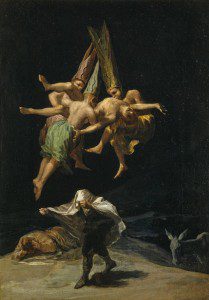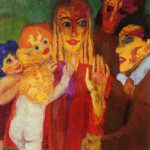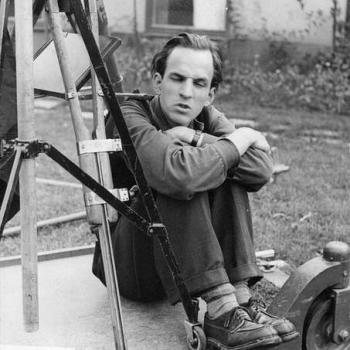
By and large, The Witch, Robert Eggers’ eerie directorial debut, has been read either as a feminist tale of socially-induced self-designation or a creepy reassertion of the chilling, as opposed to the violent, in the horror genre. Neither of these is wrong, but both miss what, for me as a Christian, was the center piece of the film, what made it both unnerving and fulfilling: the role of desire. The first time I saw it, a secular friend of mine bewilderedly wondered (after the last scene finished), “I don’t know if I should be turned on or horrified.” The entire movie might be read through this lens.
The film follows a family in the early 17th century, relatively recently arrived from England, who are banished from the “plantation” for the father’s dissident religious beliefs or activities. In due course, they arrive in the woods. The mother, father, and five children soon find themselves haunted by an evil force, but not in the traditional way. Many modern horror films concentrate either on the exterior evil or the interior psychology of its characters (think the Halloween series on the one hand and The Shining on the other). It is rare that both the evil faced and the characters themselves are enrapturing, and yet The Witch does this perfectly, precisely because throughout the film we get snapshots of some figure out there, that is, in the woods, while the family debates who among them is an evil interloper (and there are many scenes to suggest to us that one of them might be). The viewer feels himself trapped between the evil he has seen and the one he feels, the crone in the forest and demons in the hearts of these God-fearing Calvinists.
This, of course, is the Christian position; we believe both in something out there (Satan, demons) and something within us (sin), both of which are to be feared and loathed. We need not be Calvinists, like the family in question, to be in this position. Their faith is so real, so visceral, whether when they are shown, kneeling in a field after being exiled, eyes raised to heaven, light shining down through the trees, or when the father, William (Ralph Ineson), declares a fast day for the family’s myriad sins, that we cannot help but feel their pain. Even the most secular viewer is forced to feel both the pull toward Calvinistic good and the desires that ultimately tear the family apart. Each member has his or her own desire that presages and leads to their collective destruction; each seems small at first but blossoms into a hellish holocaust, resulting in not only their destruction but their seduction. By the end, we see that the evil without and the evil within were in league all along. In this sense, the film is a lesson in desire, an unflinching glance at how our wants lead us little-by-little into the hands of he who rules the wood.
William is guilty of pride; he admits as much the night before his death, falling to his knees and begging the Lord’s mercy, though he is “infected with the filth of pride.” We get few clues as to why the family was banished (or, in the accurate dialect of the film, banishèd). Yet, as the film progresses, pride seems the likely culprit. In commenting on the silver cup he stole from his wife to trade for money and the hope of food, he intimates that their family does not need such shiny objects to worship God. We know he is kicked out for having dissident ideas, but these ideas may very well be read as a prideful singularity against the communal church; he is willing to put his family in danger for the sake of his radical interpretation of the Gospel (in him we might see a type of Roger Williams or Anne Hutchinson, yet without any external support).
As blight strikes his crops, he remains convinced he can save the farm through trapping and trading. He fails miserably. His desire to save his family, underpinned by pride, leads him to let his daughter take the blame for fault after fault, creating tension between her and her mother. When William dies, he loudly confesses his own corruption, before being bucked into a pile of wood, a fitting death since, as his daughter reminds him, all he has done successfully since entering the wilderness is chop wood. His love of family, for his place as head of a group that would live the Gospel, even if alone, sows seeds of distrust among the family’s members and results in their destruction.
Katherine, his wife, (Kate Dickie) desires her dead children, desires their love and affection while pining for home, that is England. Taken together, her wants suggest a longing to no longer be a pilgrim, to be settled somewhere familiar and intimate. Once her baby is stolen, she is overwhelmed by grief, and, fearing his soul is in hell, becomes distant. She comes to suspect, in part thanks to William’s hiding his responsibility for various faults, that her daughter, Thomasin (Anya Taylor-Joy), is a witch. Her entire character might be contained in one shot, when we see her violently shaking the body of her dead son, Caleb (Harvey Scrimshaw), almost clawing off its flesh in her zeal, as she shouts Thomasin out of the room. The camera, at floor level, presents her body, bent over and covering that of her son, shaking with uncontrollable sobs. Without her children, her sense of home, she is lost.
And so Katherine’s death sequence shows this characterization in its fullness. Her hair loose, her wimple off (we almost never see her so wild), and her remaining children locked in a shed with the goats, suspected of witchery, she sees her two dead children: Samuel and Caleb (Harvey Scrimshaw). Overwhelmed with joy, she signs a book the older boy gives to her as she lets the younger one feed at her breast. And yet, this desire to see them again is deluded; the next time we see her she is sitting in a chair, cackling as a raven pecks at her breast. The baby she so longs for is dead; in its place is a sign of ill omen, bleeding her dry. Her life ends when, overcome with grief at the death of her entire family, she attacks Thomasin, believing her a witch. Her breast still bloody from the raven, she lands blow after blow on her daughter; her desire unattainable, Thomasin stabs her to death in self-defense.
Caleb is little better off. Becoming a man, he keeps stealing glances at his sister’s budding bosom. Though not truly incestuous, such urges stem from his being alone, apart from anyone else with whom he might grow up and come into his own body and feelings, a situation for which his father’s pride is to blame. At the same time, he wishes himself to be a man, to protect his ailing family. And yet, when he goes off into the woods in an attempt to save them from starvation, everything goes wrong: his sister is thrown from their horse and knocked unconscious, the horse runs away, and their dog is killed. Led along by the hare he hopes to kill so his family might survive, he chances upon a house. The viewer, unsure what to expect, is greeted first by an ankle (and it is rare we see so much skin in this film), emerging from the doorway, and then a full woman, a seductress with plump breasts and a dainty step, who beckons him come. The two kiss and, with a screech from the score, she plants her now gnarled hand into the back of his head.
Later that night, he reappears on the family farm, naked and raving (again, nakedness in this film is associated only with evil characters and their bewitched victims). After coughing up an apple, he loudly declares, before his entire family, his love for Jesus Christ, erotically moaning, parodying the sexual tension of a book like the Song of Songs. And, of course, his fit culminates with his screeching, racked with sexual pleasure: “kiss me with the kisses of your mouth.” His burgeoning desire for manliness, both in his sexuality and his longing to protect his family, is transmogrified into an open, to them anyway, effeminacy, a mockery of the cross.
And then there is Thomasin, arguably the protagonist of the film, who is just coming into her womanhood. She professes to love God, and yet, her family increasingly suspects she might be a witch, while in her desperation she tries to shift the blame to her younger siblings (the twins: Jonas and Mercy, played by Lucas Dawson and Ellie Grainger respectively). What she desires is, perhaps, just to be left alone, so that she might do her job on the farm, be a part of the family, and not be forced off the homestead to work for another family, as her parents plan. Yet, this is impossible. She is there when the baby, Samuel, is stolen; she is the one who accompanies Caleb into the woods where he is bewitched; she is the one who finds him, naked and raving in the rain. By the end, Thomasin is forced to kill her own mother in order to preserve her own life, the seemingly ultimate act against her initial desire to be a faithful daughter. And yet, she goes further. Thomasin approaches Black Philip, the family’s sinister black goat, whom the twins say speaks to them, and asks if she might hear him too. His response is an eerie sublimation of desire: “wouldst thou live deliciously? Wouldst thou see the world?”
And so, we are led into the last scene. She strips naked, and with her hair loose, signs the Devil’s book. Nude, she wanders off into the woods as the cackles and shouts of witches grow louder and louder. The film closes with her joining this cabal, her face twisted in orgasm, overwhelmed by the pleasure of belonging and power. She floats up into the sky, flying as a witch into the full moon, overcome with the sensuality of her new being.
This is the scene on which my friend remarked: “I can’t tell if I should be turned on or horrified.” He was not wrong to say so. The viewer, at least the secular one trained to see sex and desire in a certain way, finds the end erotic. Undoubtedly, the concupiscence in us all does. And yet, that is the moral of this fairy tale (and it invites a moral reading, its subtitle being A New England Folktale): desire, and the pleasure that accompanies it, whether physical or otherwise, cannot be merely personal. When a family is made up of uncommunicated desires, even if they are good in and of themselves, it unravels. Each person, an island, is slowly led, against his or her own wishes, into oblivion. And so we are warned, warned to avoid the pride and selfishness of the father, the nostalgia of the mother, and the overwrought striving of the son. The daughter lies a casualty, her hopes twisted into an orgasmic blossoming into womanhood, a womanhood independent of all structure, yet a womanhood cursed to witchery.













